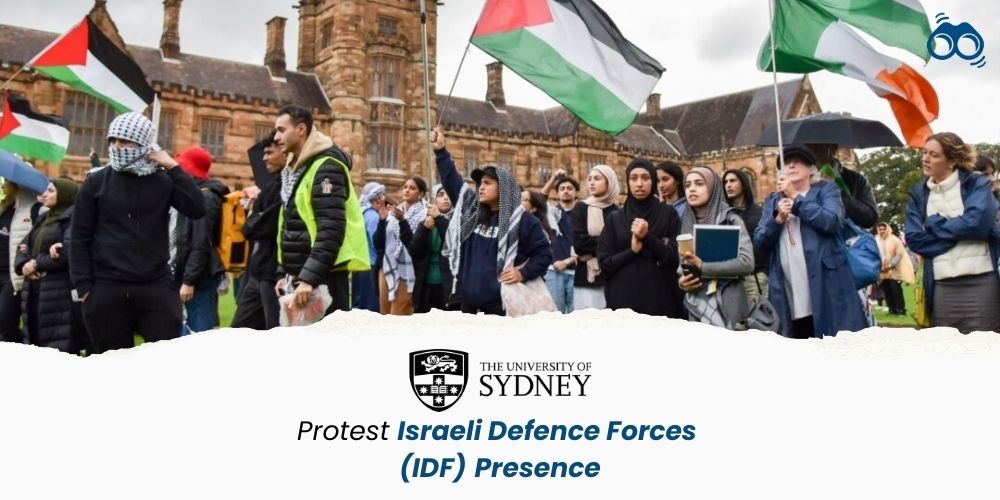Activists Demand Greater Support for Palestinian Students Amid Controversial Events
Calls for Change: Protests Highlight Discontent with Campus Access Policies
On April 9, protests erupted across the campuses of the University of Sydney (USyd), the University of Technology Sydney (UTS), and the University of New South Wales (UNSW). These demonstrations were a reaction to events hosted by pro-Israel groups, StandWithUs Australia and Israel-Is, which were advertised as "immersive VR experiences" and "interfaith panel discussions" aimed at fostering social cohesion. However, these events became the focus of significant controversy, as critics accused them of attempting to normalise and legitimise the actions of the Israeli Defence Force (IDF), which has faced allegations of war crimes in Gaza. This divide highlighted the polarised opinions among students and staff regarding the events and their broader implications.
At USyd, approximately 75 protesters gathered outside the F23 Administration Building at 6 PM, following a similar demonstration earlier at UTS, while a concurrent event took place at UNSW. Organised by Students Against War (SAW) and supported by academic staff, Palestinian solidarity groups, and anti-Zionist Jewish activists, the protesters voiced their objections by chanting, "From the river to the sea, Palestine will be free!" and waving Palestinian flags. They also criticized university administrators for allowing the events to proceed despite public backlash.
The protests were preceded by petitions and open letters submitted to university leadership. At UTS, over 200 students and staff signed a petition calling for the cancellation of the event. Similarly, at USyd, SAW gathered 120 signatures within 24 hours for an open letter condemning the invitation extended to IDF reservists, whom they accused of involvement in genocide. Nevertheless, the universities allowed the events to continue, sparking outrage among protesters.
During the USyd rally, Jacob Starling, chair of the event, accused the university administration of double standards. He pointed out that while pro-Palestinian students faced disciplinary threats for minor actions, war criminals were invited onto campus. Students had also received warnings from university administrators about potential disciplinary measures for participating in the March 26 National Day of Action for Palestine, a move that organizers viewed as an attempt to suppress pro-Palestinian advocacy.
Jeannette Monteiro, a SAW organizer, publicly criticized the university for hosting members of the Israeli Defence Forces, accusing them of genocidal acts in Gaza. She announced a campaign to hold a Student General Meeting to challenge USyd's Campus Access Policy and oppose the Universities Australia definition of antisemitism, which many students felt was being misused to silence criticism of Israel. At the protest, a speaker from Jews Against the Occupation ’48 emphasized that anti-Zionism is not antisemitism, arguing that the university's decision to host such events contradicted its values. The speaker also cited Monash University’s decision to cancel a similar event, contrasting it with the actions of USyd and UTS.
Academic staff voiced their disapproval as well. One lecturer addressed the crowd, arguing that it was unacceptable for organizations involved in genocide apologism to be welcomed on campus, particularly in light of the state of Israel’s actions in Gaza. The protesters further demanded the cancellation of Australian universities' partnerships with Israeli institutions, specifically USyd’s exchange program with the Hebrew University of Jerusalem. Their list of demands included the repeal of USyd's Campus Access Policy, the rejection of the Universities Australia definition of antisemitism, and increased support for Palestinian students and staff affected by the Gaza conflict. As chants echoed through USyd’s sandstone corridors, the activists made their stance clear: they were committed to escalating their efforts until their demands were met. The protest concluded with the crowd chanting, "Free, free Palestine!" marking a strong and determined call for change.
Editor's Note:
The recent protests across Sydney universities serve as a stark reminder of the growing polarization on campuses regarding geopolitical conflicts. The decision to host events featuring IDF reservists, despite allegations of war crimes in Gaza, underscores the complex balance that universities face between fostering dialogue and addressing ethical concerns. While proponents argue that these events aim to promote cohesion, critics see them as an attempt to normalize controversial actions. These demonstrations highlight the urgency of reevaluating campus policies to ensure that academic spaces remain inclusive and aligned with their values. Students and staff have made their voices clear, raising vital questions about accountability, advocacy, and institutional integrity.
Skoobuzz highlights that it’s time for universities to reflect on the deeper implications of such decisions and strive to be more attuned to the communities they serve. The activism surrounding these events is a testament to the power of collective action and the commitment to justice and equity.














0 Comments (Please Login To Continue)